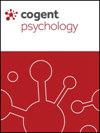Self-efficacy and alcohol consumption: Are efficacy measures confounded with motivation?
IF 1.6
Q2 PSYCHOLOGY, MULTIDISCIPLINARY
引用次数: 0
Abstract
Abstract Recent research has suggested self-efficacy measures (i.e., I can) are confounded with motivation (i.e., I will). The study tested whether two measurement conditions can disentangle motivation from self-efficacy in relation to alcohol consumption. Specifically, the study compared a standard self-efficacy measurement condition with a motivation held constant (i.e., including “If I really wanted to” in self-efficacy measures) and a vignette condition (i.e., clarifying the definition of “can” before self-efficacy measurements). A randomized posttest-only design was used. A sample of 259 university students were allocated to one of three conditions (standard; motivation held constant; vignette) and completed measures of self-efficacy and alcohol consumption. Greater self-efficacy towards both consuming and refraining from alcohol was found in the vignette (d = 0.58 & 0.74) and motivation held constant (d = 0.34 & 0.58) conditions. Heavy drinkers in the vignette (d = 1.48) and motivation held constant (d = 0.93) conditions reported greater self-efficacy for refraining from alcohol than the standard condition. Self-efficacy towards refraining from alcohol in the standard condition (r = −.55) was more highly correlated with alcohol behaviour than self-efficacy in the vignette condition (r = −.06). The study adds to the evidence that standard measures of self-efficacy are confounded with motivation. Providing a vignette clarifying the meaning of self-efficacy and including “If I really wanted to” in self-efficacy measures can overcome self-efficacy confounding.自我效能和饮酒:效能测量是否与动机混淆?
本文章由计算机程序翻译,如有差异,请以英文原文为准。
求助全文
约1分钟内获得全文
求助全文
来源期刊

Cogent Psychology
PSYCHOLOGY, MULTIDISCIPLINARY-
CiteScore
2.90
自引率
0.00%
发文量
75
审稿时长
12 weeks
期刊介绍:
One of the largest multidisciplinary open access journals serving the psychology community, Cogent Psychology provides a home for scientifically sound peer-reviewed research. Part of Taylor & Francis / Routledge, the journal provides authors with fast peer review and publication and, through open access publishing, endeavours to help authors share their knowledge with the world. Cogent Psychology particularly encourages interdisciplinary studies and also accepts replication studies and negative results. Cogent Psychology covers a broad range of topics and welcomes submissions in all areas of psychology, ranging from social psychology to neuroscience, and everything in between. Led by Editor-in-Chief Professor Peter Walla of Webster Private University, Austria, and supported by an expert editorial team from institutions across the globe, Cogent Psychology provides our authors with comprehensive and quality peer review. Rather than accepting manuscripts based on their level of importance or impact, editors assess manuscripts objectively, accepting valid, scientific research with sound rigorous methodology. Article-level metrics let the research speak for itself.
 求助内容:
求助内容: 应助结果提醒方式:
应助结果提醒方式:


